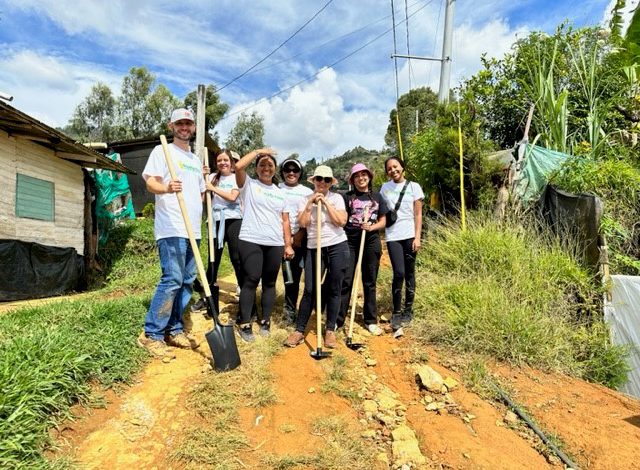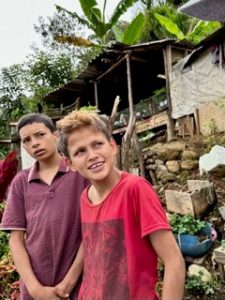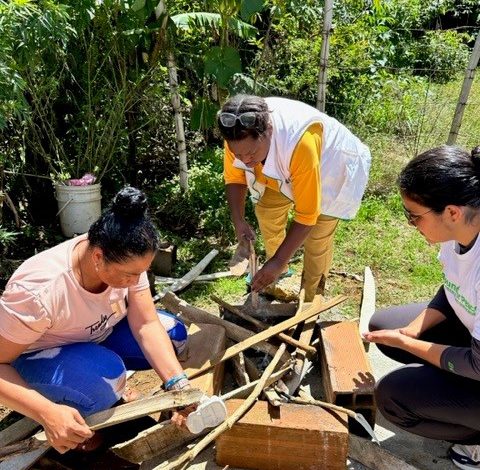The University of Florida/IFAS collaborated with the Universidad de Antioquia and Children Beyond Our Borders to organize a meaningful service-learning trip in Medellin, Colombia. As a faculty member, I had the honor of participating in the Summer 2023 trip, where students engaged in providing education, health, and nutrition services to underserved communities while immersing themselves in the local culture.
This experience underscored the significance of university-community organization partnerships in addressing social issues.
 During the trip, my focus was on working closely with Children Beyond Our Borders and Children of Medellin to support children and twelve Health Promoters (Promotoras de Salud) in their project development and resource provision. Witnessing the challenges and opportunities faced by children in Colombia was eye-opening. Marginal neighborhoods confronted issues of violence and crime, posing threats to their safety and well-being. It is worth mentioning that the Colombian government has made progress in reducing poverty through a comprehensive strategy focused on human security. By setting targets to decrease poverty and improve access to education, healthcare, housing, and public services, the government has demonstrated its commitment to addressing various aspects of poverty.
During the trip, my focus was on working closely with Children Beyond Our Borders and Children of Medellin to support children and twelve Health Promoters (Promotoras de Salud) in their project development and resource provision. Witnessing the challenges and opportunities faced by children in Colombia was eye-opening. Marginal neighborhoods confronted issues of violence and crime, posing threats to their safety and well-being. It is worth mentioning that the Colombian government has made progress in reducing poverty through a comprehensive strategy focused on human security. By setting targets to decrease poverty and improve access to education, healthcare, housing, and public services, the government has demonstrated its commitment to addressing various aspects of poverty.

Furthermore, the government invests in programs that promote social inclusion and community participation, particularly in conflict-affected areas. Comuna 13 stands as a successful example of a community project fostering inclusion, expression, and culture. As a result of these efforts, Colombia’s poverty rate decreased from 42.5% in 2020 to 39.3% in 2021, with extreme poverty declining from 15.1% to 12.2%. These initiatives have significantly improved the well-being of communities in Colombia and serve as a model for poverty reduction strategies in other countries.
Organizations like Children Beyond Our Borders contribute to these efforts through initiatives such as Urban Vegetable Gardens, empowering children to express themselves and make positive contributions to their communities.
Despite the challenges, the families and children we served in Medellin exhibited remarkable resilience and creativity. One particular child, Sebi (name changed), left a lasting impression on me. Despite facing adversity and coming from a low-income family, Sebi displayed unwavering optimism and selflessness. He consistently went above and beyond to help others, teaching me valuable lessons about the power of small actions and the ability to create positive change in our communities.

Working alongside the twelve dedicated Health Promoters was an incredibly rewarding experience. We tackled challenges such as dangerous roads and isolated houses on the mountainside, which hindered interaction among the elderly population. Through collaborative brainstorming, we explored ways to foster inclusivity and connectedness for the elderly. We provided necessary resources and supported them in developing impactful activities such as communal cooking and socializing through card games and conversations over coffee.
The results achieved in a short period were truly remarkable. One Promotora shared how these activities created a sense of community among the elderly, leading to significant improvements in their emotional and mental well-being. The Promotoras themselves gained valuable insights and skills through our collaboration, emphasizing the importance of community-based initiatives and the role individuals play in effecting positive change.
Working alongside the Health Promoters was an inspiring and fulfilling experience that reaffirmed the power of community and the significance of supporting initiatives that foster unity and create positive transformations.
 1
1
